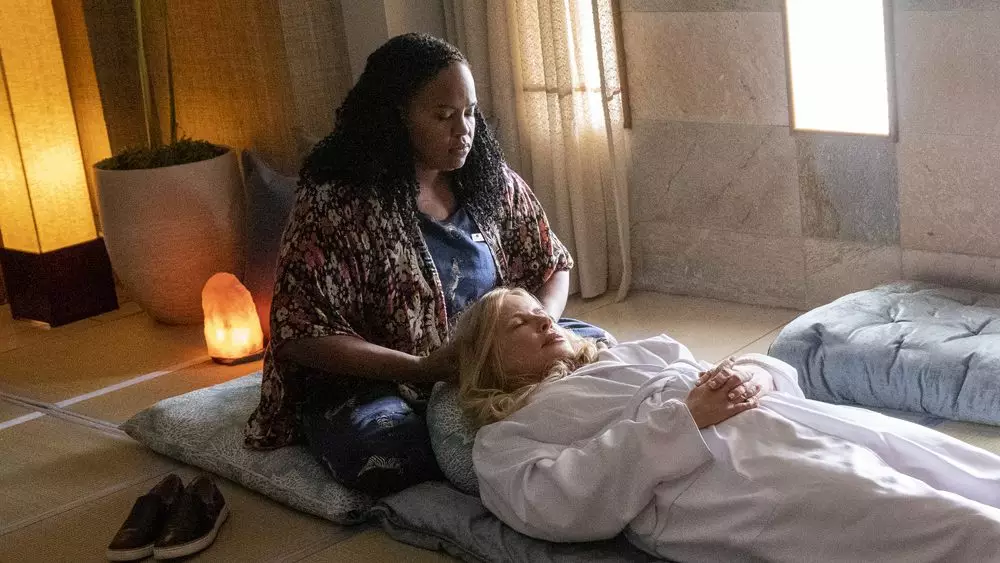With the upcoming return of Natasha Rothwell to HBO’s breakout series The White Lotus, a remarkable transformation in her artistic journey is evident. Rothwell’s trajectory from being a supporting character to a creator and lead star signifies a significant shift not only in her career but in the narratives that resonate with her. The show, which first introduced her as Belinda Lindsey, the resort’s spa manager in Season 1, has evolved into a platform for Rothwell to delve deeper into her artistry and explore permutations of complex characters reflecting authentic human emotions.
HBO’s anthology series has given Rothwell a commanding stage, enabling her to challenge Hollywood’s often reductive views on characters, particularly those from diverse backgrounds. As she recalls her experience developing her new Hulu comedy series How to Die Alone, Rothwell emphasizes the importance of authenticity and emotional depth in storytelling. For her, art should reflect life in its messiness and nuances. Rothwell has outright rejected the Hollywood tendency to pigeonhole actors based on their past roles, asserting that multifaceted depictions of characters are not just possible but necessary.
Rothwell’s desire to show complexities in character mirrors the evolving television landscape where audiences increasingly demand genuine representation. Her character, Mel, in How to Die Alone, embodies this ethos; she is a woman who grapples with her unfulfilled dreams and the specter of loneliness, all precipitated by a life-changing near-death experience. This character portrays not just comedy but resonates with deeper themes of hope and self-discovery—a reflection of Rothwell’s journey as a writer and performer.
When discussing her past experiences, Rothwell highlights how her time on Insecure was instrumental in shaping her approach to character development and storytelling. Working alongside Issa Rae provided invaluable insights into what makes a story truly resonate with audiences. By acknowledging both the successes and failures observed in her previous roles, Rothwell developed a keen sense of her unique voice, desires, and the authenticity she wanted to bring to her projects.
Rothwell’s collaboration with Mike White, creator of The White Lotus, is another cornerstone of her artistic journey. She recalls the initial nervousness of revisiting Belinda, likening it to slipping into a wet bathing suit—awkward at first but ultimately fulfilling as she reconnects with the character. This beautifully encapsulates the delicate balance of familiarity and growth in performance, hinting at a deeper narrative arc that may unfold as Rothwell returns to her roots.
This relationship with White has cultivated an environment where creativity flourishes, allowing Rothwell to explore the character’s evolution within the series. Her enthusiasm to bring Belinda back in Season 3, set in Thailand, showcases an artist comfortable with both her past and her future while remaining excited about the stories she still has to tell.
What’s particularly notable about Rothwell’s progress is her commitment to breaking narrative boundaries to depict diverse experiences. The importance of her representation in television cannot be overstated; she champions the opportunity for characters who resemble her—complex, emotional, and multifaceted. By steering away from superficial categorizations, Rothwell paves the way for a broader spectrum of narratives that embrace the fullness of the human experience.
The melding of humor and seriousness that Rothwell achieves in How to Die Alone is emblematic of her broader message: life is filled with contradictions, and our stories deserve that complexity. As audiences hear her voice resonate through these new projects, they are reminded that comedy can emerge from paths laden with heartache, and authenticity remains the driving factor.
Natasha Rothwell is not just an actress returning to a beloved role; she is an evolving narrative architect who embodies a new wave of storytelling that is raw, authentic, and unapologetically diverse. As she leads her own projects and continues her collaboration with established creators, there’s no doubt that her influence in the industry will only sharpen. Rothwell’s journey is a testament to the power of authenticity in entertainment, and it sets an inspiring standard for future storytellers seeking to engage with the full spectrum of human emotion. With each role, she breaks down barriers and creates a new narrative that resonates not just with her but also with audiences longing for authenticity and depth in storytelling.

